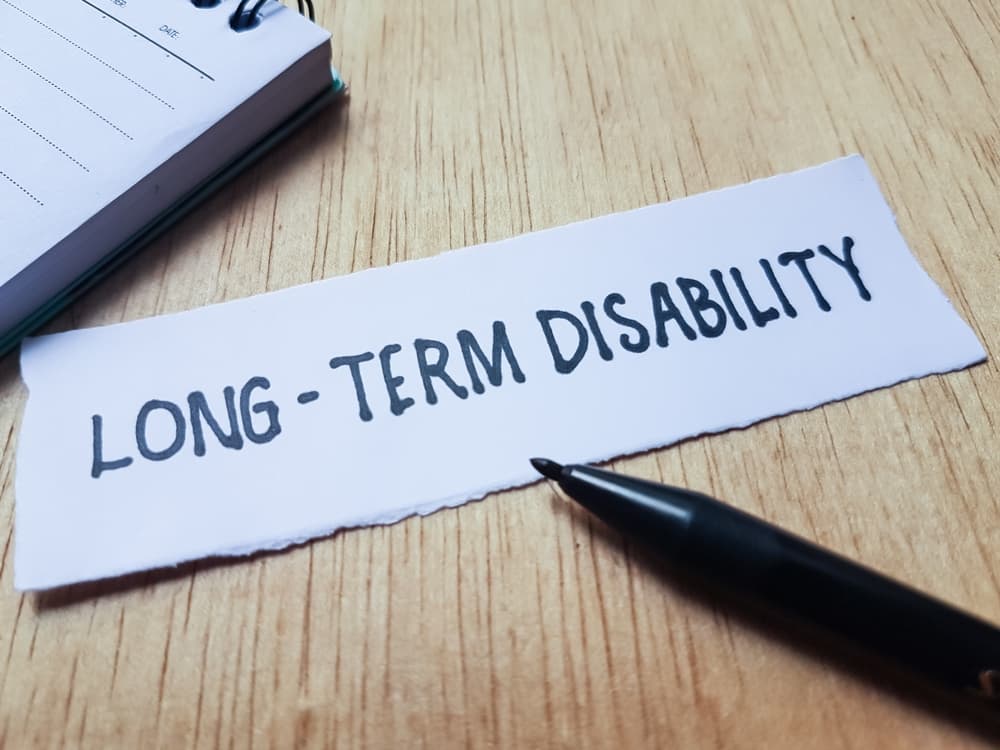Long-Term Disability (LTD) insurance, sometimes called Income Disability Insurance (IDI), is a crucial financial safety net designed to replace a portion of your income if you become unable to work due to a prolonged illness or injury. For many, a serious health event or accident can swiftly render them unable to perform their professional duties, leading to a sudden and devastating loss of income.
Understanding the terminology associated with LTD policies is not just beneficial for those considering coverage, but absolutely essential for current policyholders navigating a claim denial.
Core Concepts & Definitions

Long-Term Disability (LTD) Insurance: A type of insurance that provides income replacement benefits if an individual becomes unable to work for an extended period due to a qualifying illness, injury, or mental health condition. Unlike short-term disability, LTD benefits typically last for several years, up to retirement age, or until the disability ends.
Disability: In the context of LTD, this refers to a physical or mental condition that prevents an individual from performing the duties of their occupation or any occupation for which they are reasonably suited by education, training, or experience. The specific definition of disability varies by policy and by state. For example, in California, the definition requires, among other things, the ability to perform an occupation with reasonable continuity in the usual and customary way and also considers station in life and mental and physical capacity.
Policyholder/Insured: The individual who owns the LTD insurance policy and is covered by its terms.
Insurer/Carrier: The insurance company that underwrites and provides the LTD policy and pays out benefits. This occurs under employer-sponsored policies that are fully insured and even sometimes self-insured.
Benefit Period: The maximum length of time for which disability benefits will be paid under the policy. Benefit periods can include 24 months or 2 years, 5 years, to age 65, Social Security Normal Retirement Age (SSNRA) or, more rarely, for life.
Elimination Period (Waiting Period): The period of time, starting from the date of disability, that you must wait before your LTD benefits begin. Common elimination periods range from 30, 60, 90, or 180 days, and sometimes longer. Elimination periods vary and depend on your specific policy.
Benefit Amount: The amount of money the policyholder receives as a disability payment. This is typically a percentage of your pre-disability income, sometimes ranging from 50% to 70%.
Own Occupation Disability: A definition of disability where benefits are paid if you are unable to perform the material and substantial duties of your specific occupation at the time you became disabled, even if you could perform a different type of work. Again, the definition varies by policy and by state. This is generally considered a more favorable definition for the insured. It is sometimes referred to as regular occupation, as well.
Any Occupation Disability: A definition of disability where benefits are paid if you are unable to perform the duties of any occupation, also for which you are reasonably qualified by education, training, or experience. This is a stricter definition and can make it harder to qualify for benefits. The definition can vary greatly by policy and state. It often has a “gainful” requirement where an insured needs to be able to earn a percentage of what they were making before, which can be protective.
Modified Own Occupation / Transitional Own Occupation: A hybrid definition that combines elements of both "own occupation" and "any occupation." For example, a policy might pay benefits if you cannot perform your "own occupation" for the first 24 months, and then switch to an "any occupation" definition thereafter.
Residual Disability (Partial Disability): A provision that allows for partial benefits if you can work, but your disability causes a reduction in your income, usually by a certain percentage (e.g., 20% or more). This allows you to receive some benefits while still working part-time or in a reduced capacity.
Presumptive Disability: Conditions that are automatically considered a total disability under the policy, even if you can perform some work. These typically include loss of sight in both eyes, loss of hearing in both ears, loss of speech, or loss of use of two or more limbs.
Policy Features & Riders
Premium: The regular payment made by the policyholder to the insurance company to maintain the LTD policy coverage.
Rider: An optional add-on to an insurance policy that provides additional benefits or modifies existing ones, usually for an extra cost.
Cost of Living Adjustment (COLA) Rider: A rider that increases your disability benefits over time to help offset the effects of inflation. Benefits typically increase annually by a certain percentage.
Future Increase Option (FIO) Rider (or Guaranteed Insurability Rider): A rider that allows you to purchase additional coverage in the future without undergoing further medical underwriting, even if your health declines. This is beneficial as your income grows.
Non-Cancellable & Guaranteed Renewable: A strong policy provision meaning the insurer cannot cancel the policy or increase premiums as long as you pay them on time. This is the most secure type of policy.
Guaranteed Renewable: A policy provision meaning the insurer cannot cancel the policy, but they can increase premiums for an entire class of policyholders (not just you individually).
Return of Premium Rider: A rider that refunds a percentage of the premiums paid if you do not make a claim over a specified period.
Catastrophic Disability Rider (Catastrophic Loss Rider): A rider that provides an additional benefit payment if you experience a severe disability that requires assistance with Activities of Daily Living (ADLs) or cognitive impairment.
Waiver of Premium: A provision that waives future premium payments once you become disabled and begin receiving benefits, typically after the elimination period is met.
Rehabilitation Benefit: A policy provision that encourages and may even cover expenses for programs designed to help you return to work.
Recurrent Disability: A provision that allows a disabled individual to return to work for a short period (e.g., 6 months) and, if they become disabled again from the same or a related cause, the elimination period is waived, and benefits resume as a continuation of the original claim.
Claims Process & Exclusions
·Claim: A formal request made by the policyholder to the insurance company for benefits under the terms of the policy.
Claim Adjuster/Representative: The individual appointed by the insurance company to investigate and manage your long-term disability claim.
Attending Physician Statement (APS): A form completed by your treating physician that provides medical information about your condition, diagnosis, treatment, and functional limitations.
Independent Medical Examination (IME): An examination by a physician chosen and paid for by the insurance company to assess your medical condition and functional abilities. The findings of an IME can be used to support or deny a claim.
Functional Capacity Evaluation (FCE): A comprehensive test administered by a physical or occupational therapist to objectively measure an individual's physical abilities and limitations related to work.
Activities of Daily Living (ADLs): Basic self-care tasks typically used to assess a person's level of independence. These include bathing, dressing, eating, transferring (moving from bed to chair), toileting, and continence. While more common in LTC, some LTD policies may reference ADLs for catastrophic riders.
Instrumental Activities of Daily Living (IADLs): More complex activities necessary for independent living, such as managing finances, preparing meals, shopping, and managing medication. Less commonly used in LTD policies directly for disability definitions, but can be relevant for assessing overall functional impairment.
Exclusion: Specific circumstances, conditions, or causes of disability that are not covered by the policy. Common exclusions include:
Pre-existing Conditions: A medical condition that existed before the policy's effective date. Policies often have a look-back period (e.g., 3-12 months) and a waiting period (e.g., 12 months) before benefits for a pre-existing condition will be paid.
- Self-Inflicted Injuries: Injuries resulting from suicide attempts or intentional self-harm.
- War or Acts of War: Disabilities arising from military conflict.
- Participation in a Felony: Disabilities incurred while committing a felony.
Elimination Period Met/Satisfied: The point at which the waiting period has passed, and you are eligible to begin receiving benefits if your claim is approved.
Approval/Denial: The insurer's decision to either grant or reject your claim for disability benefits.
Appeal: The process by which a policyholder can challenge a denial of their disability claim. This typically involves submitting additional medical evidence and arguments to the insurer.

ERISA (Employee Retirement Income Security Act of 1974): A federal law that sets minimum standards for most voluntarily established employer-sponsored plans, including retirement, life, health and disability benefits. Many employer-sponsored LTD plans are governed by ERISA, which has specific rules for claims and appeals, but there are exceptions.
Taxability of Benefits:
- Employer-Paid Premiums: If your employer pays your LTD premiums, the benefits you receive are typically taxable as income.
- Employee-Paid Premiums (After-Tax): If you pay your LTD premiums with after-tax dollars, the benefits you receive are generally tax-free.
- Split Premiums: If both you and your employer contribute to the premiums, the taxability of benefits will be proportionate to who paid what.
Types of LTD Policies
Group LTD Insurance: Coverage provided through an employer, typically as an employee benefit. Premiums are often lower, but coverage may be less comprehensive than individual policies, and benefits may be taxable if the employer pays premiums.
Individual LTD, or IDI, Insurance: Coverage purchased directly by an individual from an insurance company. These policies are generally more customizable, have stronger definitions of disability (like "own occupation"), and benefits are typically tax-free if paid with after-tax dollars. They are often more expensive than group policies.
Voluntary LTD Insurance: Group LTD coverage offered by an employer where employees choose to enroll and pay all or a portion of the premiums.
Buy-Sell Disability Insurance: A policy designed for business owners, providing funds to buy out a disabled partner’s share of the business, ensuring continuity.
Key Person Disability Insurance: A policy that protects a business against the financial loss incurred if a crucial employee becomes disabled. The business is the beneficiary.
Important Considerations
Portability: The ability to continue your LTD coverage if you leave your employer. Group policies are generally not portable, while individual policies are.
Integration with Social Security Disability Insurance (SSDI) Benefits: Many LTD policies are integrated with SSDI. This means that if you receive SSDI benefits, your LTD benefit may be reduced by the amount of your SSDI benefit. Insurers sometimes require or strongly encourage policyholders to apply for SSDI.
Social Security Offset: The reduction in your LTD benefit by the amount of Social Security Disability Insurance benefits you, or often your dependents, receive.
Definition of Income: What counts as "income" for the purpose of calculating your benefit amount. This can include base salary, commissions, bonuses, and sometimes even pre-tax contributions to retirement plans.
Maximum Monthly Benefit: The highest amount of money the policy will pay out in benefits per month, regardless of your income.
Own Occupation Period: The length of time (e.g., 24 months) that the "own occupation" definition of disability applies before potentially switching to "any occupation."
Mental Health/Substance Abuse Limitations: Some LTD policies have limitations on the duration of benefits for disabilities primarily caused by mental health or illness conditions or substance abuse, sometimes capping benefits at 12 or 24 months. Some policies also have self-reported symptom limitations and other limitations for certain medical conditions. It’s important to consult your policy to see if such limitations or exclusions apply.
Contact Sandstone Law Group Today

At Sandstone Law Group, we understand the financial strain and challenges policyholders experience when an illness or injury prevents them from working. We firmly believe that policyholders deserve robust representation against insurance companies.
Your policy's benefits should be based on your inability to perform the duties of your occupation, not arbitrary interpretations or unjustified denials.
Sandstone Law Group is dedicated to building trust and challenging insurers who are not honoring the long-term disability plans purchased to protect your income.
If you are experiencing delays, denials, or confusing communications, contact us today at (602) 615-0050 to schedule a consultation